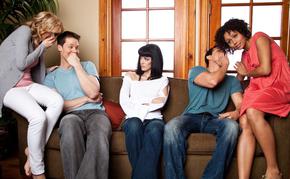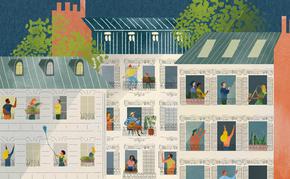The views expressed in our content reflect individual perspectives and do not represent the authoritative views of the Baha'i Faith.
Scientists have a term for the all-too-human tendency to accept what supports our beliefs while rejecting any other information: they call it confirmation bias.
You’ve heard that old saying “Don’t confuse me with the facts,” right? That’s confirmation bias—letting our feelings dominate our rational minds.
The renowned scientist Elizabeth Kolbert, who wrote about confirmation bias recently, said:
Consider what’s become known as “confirmation bias,” the tendency people have to embrace information that supports their beliefs and reject information that contradicts them. Of the many forms of faulty thinking that have been identified, confirmation bias is among the best catalogued; it’s the subject of entire textbooks’ worth of experiments.
Presented with someone else’s argument, we’re quite adept at spotting the weaknesses. Almost invariably, the positions we’re blind about are our own.
And … confirmation bias … has a physiological component. … research suggests that people experience genuine pleasure—a rush of dopamine—when processing information that supports their beliefs. “It feels good to ‘stick to our guns’ even if we are wrong,” they observe. – Why Facts Don’t Change Our Minds, The New Yorker, February 27, 2017.
Of course, people aren’t robots or computers—we all have prejudices, biases and emotionally-charged beliefs. We can be opinionated and obstinate about those beliefs. Our rational thoughts sometimes fight with our emotions. That means we often interpret and favor new information in ways that confirm what we already feel and believe.
On the opposite side of that equation, we also tend to give less consideration or weight to any alternative explanations or positions. We reject what we don’t already believe. Confirmation bias, then, means our cognitive equipment—our mind—sometimes gets overruled by our emotional equipment—our heart and our gut. We allow our minds to confirm the information we like, and repudiate what we don’t.
Impaired thinking results.
It’s the old objective versus subjective debate—do we listen primarily to facts, or do we listen primarily to feelings? Generally, most people pay more attention, even if in a subconscious way, to their deepest inner feelings, and don’t want to be confused by the facts.
This tendency can get us into all kinds of trouble.
When we gather information or make decisions so selectively, we leave reason behind. When we allow our inner prejudices—whether positive or negative—to influence our life decisions, we run the risk of making poor choices. When we let confirmation bias support our existing positions rather than call them into question, we harden our attitudes, close our minds and ultimately live our lives based on imagination and illusions.
Nobody wants a life based on illusions or faulty thinking. So what’s the solution? The Enlightenment philosopher Rene Descartes recommended putting aside all assumptions, values and preconceived beliefs in the attempt to determine what, if anything, is true. The Baha’i teachings take a similar path when they suggest becoming a true seeker—and a truth seeker—by trying to transcend our emotions when we investigate the truth:
But, O my brother, when a true seeker determineth to take the step of search in the path leading to the knowledge of the Ancient of Days, he must, before all else, cleanse and purify his heart, which is the seat of the revelation of the inner mysteries of God, from the obscuring dust of all acquired knowledge, and the allusions of the embodiments of satanic fancy. He must purge his breast … of every defilement, and sanctify his soul from all that pertaineth to water and clay, from all shadowy and ephemeral attachments. He must so cleanse his heart that no remnant of either love or hate may linger therein, lest that love blindly incline him to error, or that hate repel him away from the truth. – Baha’u’llah, The Book of Certitude, p. 192.
That advice might seem strange at first. How, after all, can we cleanse our hearts from every “remnant of either love or hate”? Doesn’t purging our heart of all emotional attachments sound kind of heartless? Isn’t love a positive emotion that we should keep at all costs? Wouldn’t this method of seeking the truth mean we’d have to stop loving God?
Not necessarily. What if we thought about cleansing our hearts this way:
It has been suggested that the words of Baha’u’llah that a true seeker should “so cleanse his heart that no remnant of either love or hate may linger therein, lest that love blindly incline him to error, or that hate repel him away from the truth,” support the viewpoint of methodological agnosticism. But we believe that on deeper reflection it will be recognized that love and hate are emotional attachments or repulsions that can irrationally influence the seeker; they are not aspects of the truth itself. – The Universal House of Justice, Messages 1963 to 1986, pp. 389-390.
So those emotional attachments we all have—which we know can blind us to reality—might “irrationally influence” us, and lead us to the same kind of confirmation bias cognitive scientists now warn us about. In the next essay in this series about facts, we’ll see if we can figure out a way to deal with those emotional attachments in our quest for truth.
You May Also Like
Comments

















Most of us do not know how to look for it or what we would do with it when we found it. The end result is one thing when looking at Authors of Holy Writings; it is ...something else entirely when considering writings in our mass media. Those authors have no responsibility to be unbiased - no matter what they say - or to identify their own biases and eliminate them.
This is a subject that has interested me over the years and recently, as our ever shrinking global society becomes more integrated, the necessity for all of us to take a gentle approach and empathetic view of differing viewpoints continues to increase.